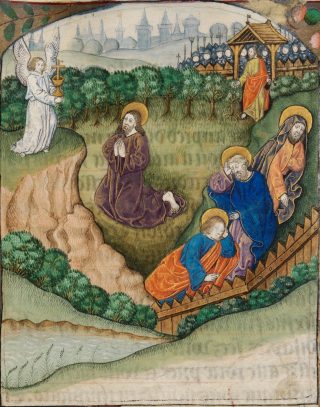Grace to you and peace from God our Father and the Lord Jesus Christ.
 Tonight we meditate on the Lord’s Prayer in light of the Advent of Christ. You might wonder, “Is there some other way to meditate on the Lord’s Prayer, given that the only reason we know it is because of Christ’s Advent?” And you would have a very good point. Nevertheless, there are certain parts of the Lord’s Prayer that God’s people had been praying long before the Advent of Christ. All seven petitions can be found in the psalms, perhaps not word for word, but certainly according to the general requests. In the Lord’s Prayer Jesus brought these petitions together such that everything we’ll ever need can be found in seven glorious petitions. But the only words that really stand out as a new revelation with the Advent of Christ are the first two: Our Father.
Tonight we meditate on the Lord’s Prayer in light of the Advent of Christ. You might wonder, “Is there some other way to meditate on the Lord’s Prayer, given that the only reason we know it is because of Christ’s Advent?” And you would have a very good point. Nevertheless, there are certain parts of the Lord’s Prayer that God’s people had been praying long before the Advent of Christ. All seven petitions can be found in the psalms, perhaps not word for word, but certainly according to the general requests. In the Lord’s Prayer Jesus brought these petitions together such that everything we’ll ever need can be found in seven glorious petitions. But the only words that really stand out as a new revelation with the Advent of Christ are the first two: Our Father.
It is only through the Son of God that we can call God Father, because it is only through the Son of God that we have been called sons of God. We bear the name of Jesus, which was put on us in Baptism. And we pray for the sake of this name, similar to how Daniel prayed, “Delay not, for your own sake, O my God, because your city and your people are called by your name” (Dan. 9:19). Daniel was very honest about what belongs to us: “open shame.” We are shame-faced before God because “we have sinned, committed iniquity, done evil, rebelled, turned aside, and not listened,” as Daniel said (Dan. 9:5-6). In short, the sinful nature is a stubborn, recalcitrant donkey, and cannot call God Father or expect to receive anything good from him.
But having been baptized into Jesus’ name we can call God Father, for Jesus’ sake and not for our own sake. To us belongs shame, but to Jesus belongs righteousness, and according to his righteousness he has baptized us, pardoned our sins, and given us to call God “Father.” In other words, at his Advent the Son of God put us in his place so that we could address God as he does.
And the word “our” of the “Our Father” tells the rest of the story. If the word “Father” shows that Jesus has put us in his place, the word “our” shows that Jesus has put himself in our place. I’ll explain. There’s never a time when we leave the word “our” out of the Lord’s Prayer. Even when we pray the Lord’s Prayer in solitude we don’t omit the “our” or change it to “my Father.” This is partly because the Lord’s Prayer is a corporate prayer of the Church, and so we always pray with and on behalf of one another.
But there’s greater significance to the word “our.” We always say “our Father” because Jesus himself is always praying this prayer with us. Or better put, we’re always praying it with him. When we open our mouths and say “our Father,” we’re not starting the prayer, but joining in with Jesus who is the true pray-er of this prayer.

This is quite remarkable to consider. Jesus prays the Fourth Petition of the Lord’s Prayer, “Give us this day our daily bread,” because he came in the flesh, put himself in our place, and knew personally what it is to be hungry and need food and drink and all other necessities of the body.
But even more remarkable is that Jesus prays the Fifth Petition, “And forgive us our trespasses.” Jesus lumps himself in with sinners, not because he committed any sins that need forgiving, but because he bore our sins. Indeed, he bore our sins to such an extreme that he fully took our place as the sinner before God. He suffered the punishment for all sins as if he was liable to God for them.
And so we see in these two little words “our Father” the great exchange. At his Advent, Jesus put us in his place, such that we can call his Father our Father. And at his Advent Jesus put himself in our place, such that he could include himself in speaking of “our” trespasses. What words are a more concise summary of the Gospel than these: “our Father”?
Jesus has risen from the dead and ascended into heaven, and yet he has not merely left behind the Lord’s Prayer as a memento of his coming to earth. He remains our incarnate Lord who is ever in the flesh and ever with us on earth. And as a human being, albeit a divine one, he continues to intercede for us human beings and prays his prayer for us. Isaiah prophesied that Christ would do this: “he bore our sin and makes intercession for the transgressors” (Is. 53:12). We also hear in the book of Hebrews, chapter 7, that Jesus “is able to save to the uttermost those who draw near to God through him, since he always lives to make intercession for them” (Heb. 7:25). And so as we pray the Lord’s Prayer, it is our great comfort that Jesus stands us with him before the Father as children of God, and that he stands with us as our brother in the flesh. To Christ, our great High Priest and Intercessor, be glory and honor, with the Father and the Holy Spirit forever. Amen.